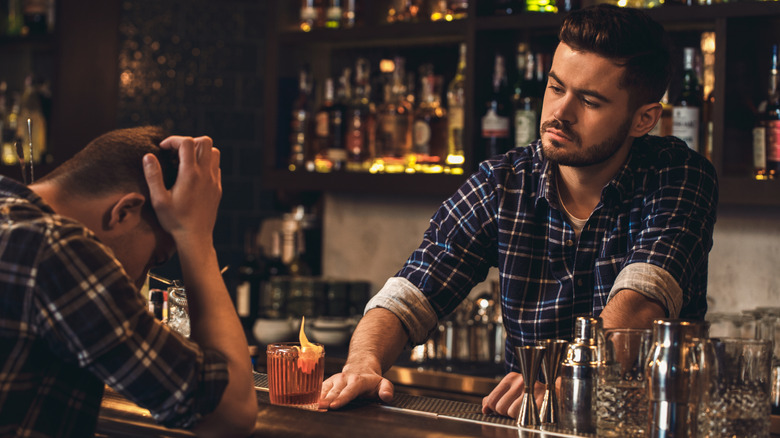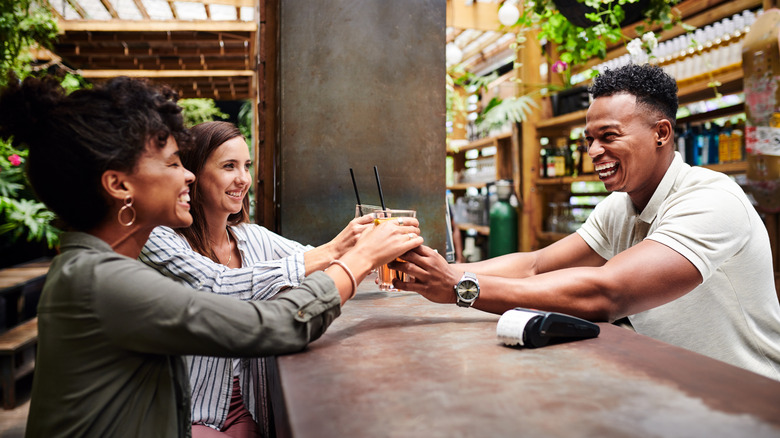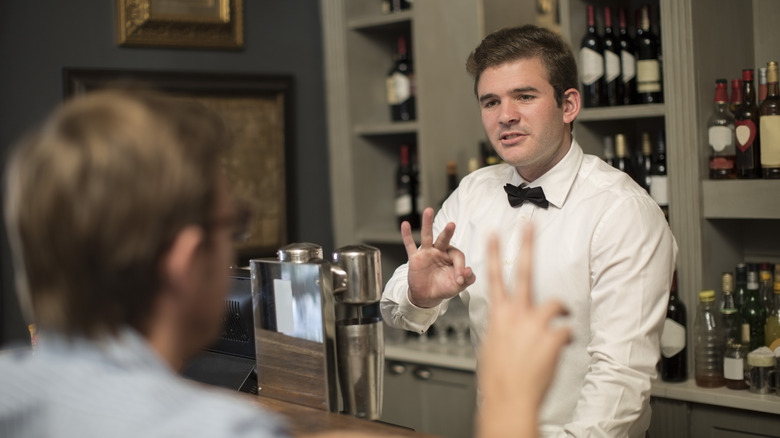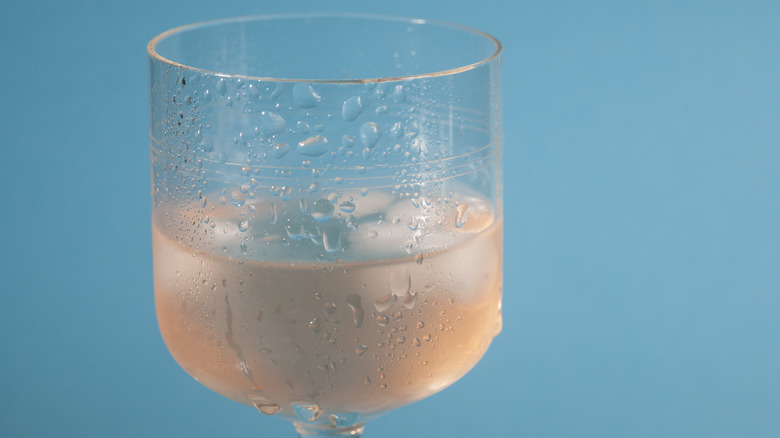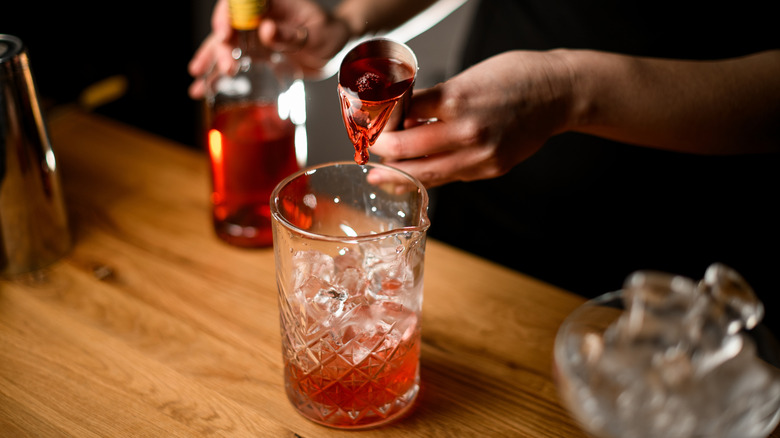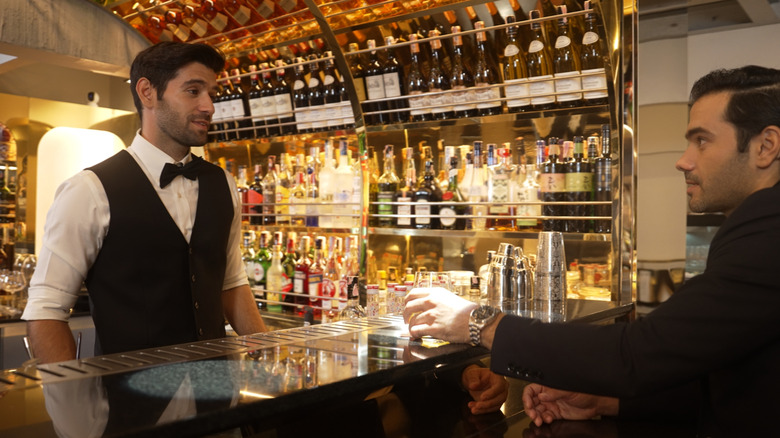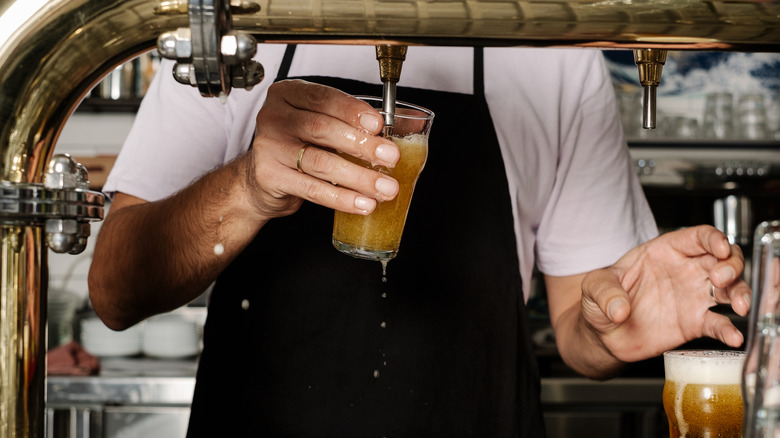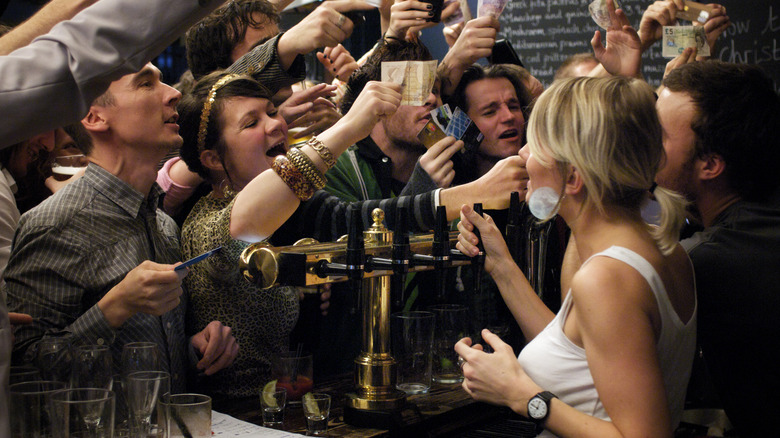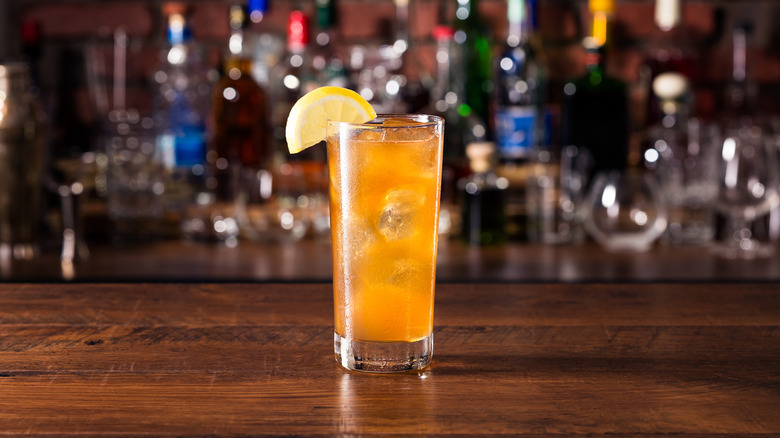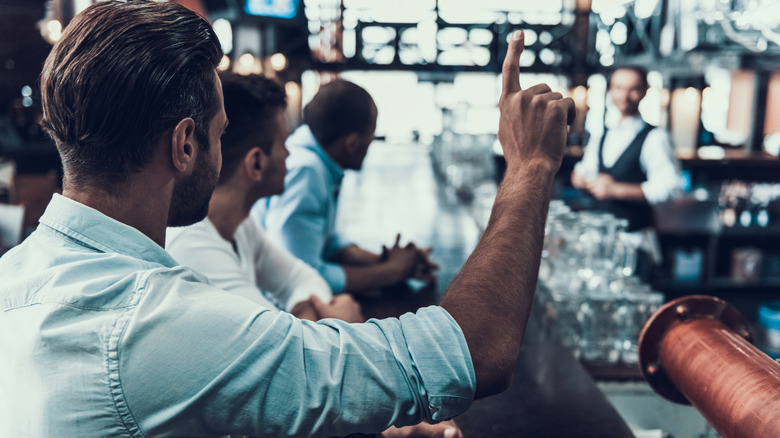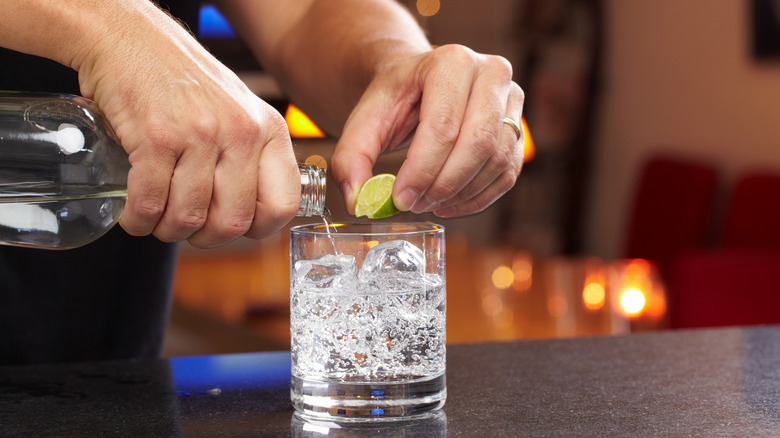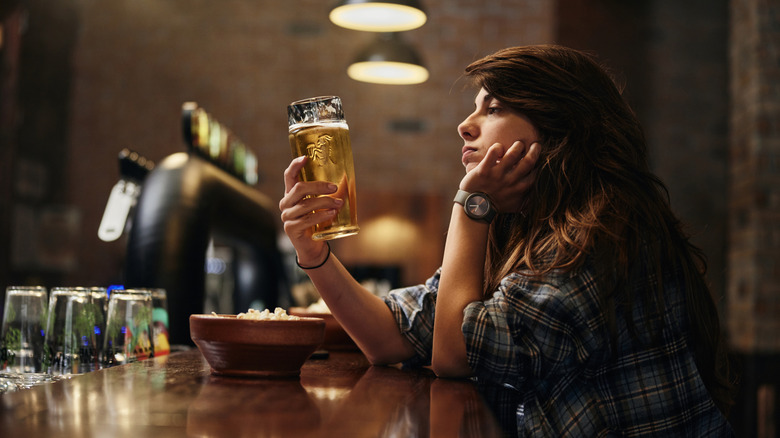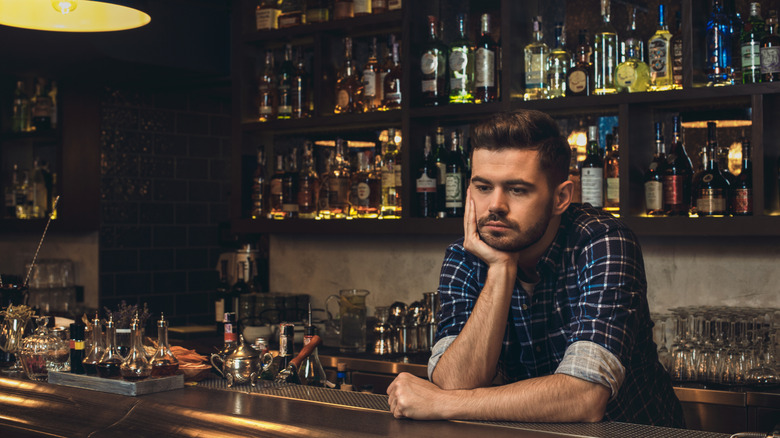Things You Should Never Say When Ordering A Drink At A Bar, According To Bartending Experts
We may receive a commission on purchases made from links.
Although bartenders will try to abide by the mantra, "the customer is always right," there are times when, frankly, you are not. Sometimes we get carried away by the lively atmosphere, but we often say things we shouldn't when ordering drinks at the bar. These phrases not only get under our bartender's skin, but they could even affect the enjoyment of our drinks and the overall vibe of the experience.
As we take a closer look, you're going to realize learning what to avoid isn't rocket science, and it's definitely not as complicated as ordering a martini like a pro. Most of the phrases we shouldn't say are simply common decency. Keep in mind that your bartender is a skilled artisan at work, not an overworked keg at a college party. With the help of our experts who have years of experience in the hospitality industry, including Luke Slater from The Cask Connoisseur; Kenneth Meehan from Hollywood Casino at Charles Town Races; Michael Vollmer from Kimpton Gray Hotel; and Corporate Beverage Director Ron Oleksa; we've broken down some of the most common phrases you need to leave at home the next time you go for drinks at the bar.
Surprise me!
You're at a new bar and ask the bartender to surprise you with something fun. Sigh. Not only a bit lazy, it borders on presumptuous to request a stranger to navigate the minefield of your preferences and serve up something you'll like. It's a lose-lose for everyone in the worst case scenario, especially if the busy bartender just slides some random shot across the counter. Luckily, there is a time and place to make spontaneity at the bar a rewarding experience (without making the bartender your enemy).
Think of your bartender as a skilled artisan who –– with the right prompts –– can work with your likes and dislikes to lead you to exciting new discoveries. Luke Slater admits that he loves it when clients ask him to surprise them. "But on this type of thing, I will always check first to see what they like, as I wouldn't want to waste a drink on someone and not have them enjoy it at all," he says. Give your bartender some direction and let them know what you're looking for, whether it's beer or wine, a mixed drink or straight pour, something sweet or dry, and, of course, specify if you have any aversions or allergies.
Slater points out that another appropriate moment to ask for a surprise drink is with food. "People love having a foodie experience, and pairing the food with the right drink can make it taste that much better."
Don't you know how to make a [insert obscure cocktail here] that I had once on vacation?
It never hurts to become friends with the bartender, but asking for a "Slippery Nipple" with a straight face isn't the best way to kickstart things. Other variations include exhaustively instructing your bartender how to make your drink (aka do their job), then crying out in disbelief when the bar doesn't carry some obscure liquor. Also, you don't have to use wild names to order simple drinks. You know you can just ask for a vodka soda, instead of ordering the "Skinny B***h," right?
Michael Vollmer tells us to be mindful of the type of establishment we're at before getting into more complicated cocktails. "If a bartender says they don't know how to make your drink, they might not have the time to learn on the spot." He encourages common sense: When ordering at the local dive bar or baseball stadium's beer stand, maybe avoid venturing into craft mixology. Consider investing in this bartender kit from Esmula, then get as creative as you'd like –– at home.
In addition, pay attention to how crowded the bar is. Ordering hot cocktails or fancy mixed drinks during rush hour could result in a lower-quality version of what you're hoping for. Not because the bartender isn't skilled; they just lack the time to perfect these more demanding beverages.
A glass of white wine with some ice, please.
We get it. Whether it's a muggy summer night or you're packed like sardines into the bar, nothing sounds better than a crisp –– and cold –– glass of white wine. No one is going to stop you from asking for some ice cubes in your wine, but your bartender might be holding back a smirk. There's nothing necessarily rude about it, so what gives?
Kenneth Meehan explains that the ice will quickly melt and muddle the flavors that make a white wine so refreshing in the first place. "Winemakers craft white wines with a specific structure, and adding ice dilutes the acidity and fruit notes, making it taste flat," he shares. Maybe it's not as delicate as sending back a bottle of wine, but it is a subtle breach of etiquette that makes your bartender question whether you're just looking for something cold. Even worse is asking for red wine with ice. "It disrupts the ideal serving temperature, mutes the aromas, and can make the tannins taste harsher," Meehan says.
If you're set on chilled wine, he suggests asking the bar staff if they can serve any of their white wines slightly colder. You could also keep your icy wine habit at home, and use this wine chiller from Homeries to maintain the bottle's chill and the wine's flavor.
Make it a strong one.
Just so we're clear, if the bartender pours you a strong one, you'll pay for a strong one. We've all had long days, but it's not okay to expect the bartender to "hook you up" with a stiffer drink free of charge. That said, your extra-boozy beverage might not even be worth it. Bartenders craft cocktails with precise measurements in mind to make getting a little tipsy taste good –– not to burn your esophagus and get you plastered as quickly as possible.
Ron Oleska admits that most of his bartenders will even brush it off if you ask for a strong one. "Our bars lean toward more spirit-forward drinks... so it will be evident once [the customers] are enjoying their cocktail." To up your vocabulary game, Oleksa further explains, "Spirit-forward is more a descriptor of a cocktail, whereas a double is a definitive volume of liquor."
So, instead of hitting your bartender with the same old tired joke, go for a more specific approach. Order a double or ask for something more spirit-forward (think a old fashioned). You can also never go wrong with ordering your drink neat or conversely, "on the rocks."
Ummm...
You've been waiting for 15 minutes but when the bartender asks what you'd like, you're speechless. In fact, you haven't even glanced at the menu. Bartenders operate like clockwork –– especially when the bar is slammed –– and when they're really in the groove, they're juggling nine tasks and thinking three steps ahead. They don't have the time (or patience) for your blank stare.
Kenneth Meehan comments that there are a few simple ways to make your bartender's job easier and improve everyone's spirits. "Be ready with your order when it's your turn, know what you want, and order everything at once," he says. "If you're ordering for a group, avoid requesting one drink at a time –– it slows things down." If you're unsure what to order, at least prep some questions to help the bartender narrow down what you'd like.
Additionally, if your order isn't very clear, the bartender could get confused and serve you something you didn't think you ordered. Luke Slater suggests listing your drinks in a logical order, not only for clarity but for the optimal experience. "For example, if you're ordering a cask ale or a Guinness, mention those first," he explains. "These drinks need time to settle before they're topped up, so getting them started right away helps keep everything moving smoothly."
Pour me whatever's cheapest.
Bartenders are no strangers to awkward requests –– and are masters at handling them –– but hitting them with a "What's cheapest?" can quickly stunt the flow of a good interaction. Luke Slater understands that customers want the most for their dollar, but admits that there are better ways to ask for what's cheapest. "The phrase itself can sometimes come across as dismissive of the establishment's offerings or suggest that price is the only concern," he shares. Also, you could end up with something entirely underwhelming. After all, if you wanted cheap, you could have just pulled a Bud Light out of the fridge at home.
Even if you're at the type of place that doesn't list prices on the menu, you could better gauge the situation –– without sounding cheap –– by asking for the costs of two drinks. Slater recommends specifying a price range or asking for the establishment's best-value drink. "This way, the conversation focuses on getting the best experience for your money rather than just finding the cheapest pour," he says.
Another issue that emerges when you're a bit too blunt about the price is the implication that you're a lousy tipper. "As friendly as your local bartender may be, they are still working to make a living," says Michael Vollmer. "Order those budget-friendly drinks and enjoy yourself, but remember to take care of the people taking care of you."
Could you hurry it up in here?!
Do we really need to remind you not to be a jerk in public? Your bartender knows you've come out to let off some steam, but there's no use directing your pent-up problems at the person about to pour your drink. Bars get busy, and sometimes it's just one bartender against the world. Rushing them or showing crass signs of frustration will just get on the bartender's nerves and put everyone on edge around you. Remember, you've come out to enjoy yourself, not make yourself the neighborhood enemy.
Echoing this sentiment, Luke Slater admits that the worst way to get his attention when he's behind the bar is by cutting in front of other patrons. "Other things include aggressively tapping the bar or making exaggerated noises like sighing or coughing to signal impatience," he laments. While your bartender wouldn't stoop so low as to mess with your drink, Slater mentions that some eye contact, a polite nod, and a little patience go a long way to keeping the mood light and the drinks flowing.
One Long Island iced tea, please.
Remember when we mentioned how bartenders carefully craft cocktails, to better integrate the punch of liquor with other flavors? Well, the Long Island iced tea throws all of that out of the window. The boozy beverage packs vodka, gin, rum, tequila, and triple-sec into a glass... then a splash of lemon juice and cola. More of a college-party challenge than legitimate cocktail, it has undoubtedly invoked a handful of sloppy nights and regretful morning-afters.
While the rowdy Long Island may be a bartender's worst nightmare, Ron Olekaa views the drink from a mixologist's perspective. "One of my most dreaded drinks to hear ordered is the Long Island Iced Tea (or worse yet, the Strong Island)," he comments. "There are so many great cocktails out there that have a similar ABV but offer a much better experience."
Oleksa encourages us to broaden our horizons and try more balanced drinks –– even if that means asking your bartender to swap out a liquor you don't like for another. "We do our best not to judge any [special] requests," he says. "At the end of the day, we tend the people, not the bar."
Michael Vollmer points out that changing the base spirit in your cocktail is usually a pretty easy accommodation to make, and won't cause any hiccups in service. "For example, an espresso martini is typically made with vodka, but swapping it for tequila is not uncommon," he says.
What's good?
Ask the bartender "What's good here?" and they'll undoubtedly think, "I don't know, everything?" Bars are usually not in the business of offering bad items on the menu. If you're just being cheeky, bartenders already have enough to put up with, and they've probably heard the joke a zillion times. However, if you're at a loss with the menu and genuinely want some guidance, take a second to read the room. Choose a moment when the bartender doesn't look overwhelmed, and meet them halfway with some ideas of your own.
Kenneth Meehan says a vague request during a busy rush can be frustrating. "Bartenders aren't mind readers, and crafting a random drink takes time away from serving others efficiently." Instead, he suggests preparing yourself with some specifics, like, ”'I love whiskey and citrus flavors' or 'I usually drink vodka sodas but want to try something new.'" Even asking for "something fruity" is a start. When done right, it can give the bartender an exciting chance to show off their skills (and a tasty new drink for you).
Also, when it comes to painstakingly interrogating the bartender over every item on the menu, Meehan admits that bartenders just don't have the time. Be more specific to speed things along. "'What's your best-selling tequila cocktail?' or 'Do you have a good smoky bourbon drink?'" he proposes. You could also choose two drinks that intrigue you and ask for the bartender's thoughts.
I said Tito's and vodka!
Vodka sodas are the lifeblood of the bar scene. The light and refreshing drink is a safe bet when you're undecided, especially to start the night. With just a touch of bitterness, the cocktail goes down pretty smooth and won't interfere with other flavors. One might even surmise that their popularity grew to such an extent in the bars that it leaked out into the rampant canned seltzer scene.
Not to dampen your spirits, but Michael Vollmer cautions against ordering a Tito's and vodka. Why, though? "You probably meant Tito's and soda," he clarifies. "We all make mistakes, but doubling down on it with an 'I said Tito's and vodka!' is definitely not a good look." Repeat after us: Your bartender knows best. If you don't believe us, Redditors vented on a bartending thread about the staggering amount of customers that earnestly order a Tito's and vodka.
In all seriousness, knowing your cocktail terminology is going to help your bartender get you exactly what you want, without looking like an idiot. For starters, a vodka soda is one part vodka to around three parts club soda, while a vodka press adds some lemon-lime soda to the equation.
I don't like my drink.
Maybe you were a little too adventurous and now you don't like the drink the bartender set in front of you. With wine or beer you can often ask for a taste test, but trying a new cocktail is like a leap of faith. The key, though, is to be considerate. Ask yourself first, "Is it really so bad that I can't finish it?" If that's the case, let the bartender know it's nothing they did wrong, the drink just isn't your thing. Don't expect a freebie, but if you've built a good rapport with the bar, chances are they'll be cool about it. Avoid being the person that finishes half of the drink and then decides to complain.
Luke Slater recommends being upfront with your bartender from the get-go. Ask questions beforehand so you know exactly what to expect. "For example, hazy beers are meant to be cloudy, but some people immediately assume there's something wrong with them," he explains. "While I always take the time to explain why a beer tastes or looks a certain way, it can be frustrating when someone insists there's an issue without understanding the style."
Be clear about your order, so you get what you want and the bartender doesn't waste a drink. "The same goes for gin and tonic," Slater describes. "If customers don't specify between slim or original, we used to default to original, but that's not always what people want."
Just one more...
We're sorry to break it to you, but last call is last call. Once the bartender makes the announcement, you've got about 10 minutes to decide whether you'd like to order another drink or take the L and head to the next spot. Just make sure the next spot doesn't involve you waltzing into a bar that is also very clearly closing up shop.
In fact, Kenneth Meehan says one of a bartender's biggest pet peeves is customers ignoring obvious signs. "When the lights are dimmed, chairs are stacked, or a 'closed' sign is up, it means service is over," he comments. "Asking for 'just one more' or trying to get served after last call puts bartenders in an awkward position."
Also, last call means one more drink per person. One. And while you shouldn't rush the night's last cocktail, it's definitely not the time to nurse a margarita for an hour, either. This doesn't only concern bartenders' working rights, but it greatly affects your ability to enjoy a drink if the joint is closing down around you and the bartender is visibly annoyed. "Respect their closing time, and they'll appreciate you when you come back next time," Meehan concludes. How did that Semisonic song go again? "You don't have to go home but you can't stay here."
